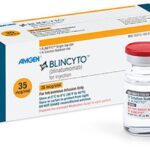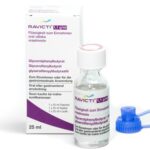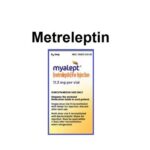Folotyn: Uses, How it Works, Side Effects, Price, Warnings

Folotyn, a brand of pralatrexate is a medication used for the treatment of patients with relapsed or refractory peripheral T-cell lymphoma. The term “refractory” is used to describe when the lymphoma does not respond to treatment (meaning that the cancer cells continue to grow) or when the response to treatment does not last very long.
The indication for Folotyn is based on overall response rate. Clinical benefit such as improvement in progression free survival or overall survival has not been demonstrated.
How is Folotyn used?
Prior to administration: mucositis should be ≤Grade 1, platelets should be ≥100,000/μL for first dose and ≥50,000/μL for subsequent doses, absolute neutrophil count should be ≥1,000/μL. Give by IV push over 3–5mins. 30mg/m2 once weekly for 6 weeks in 7-week cycles. Continue until disease progression or unacceptable toxicity develops.
Doctors can supplement with vitamin B12 (1mg IM every 8–10 weeks, starting within 10 weeks before first Folotyn dose) and folic acid (1–1.25mg orally daily, beginning 10 days before starting Folotyn and for 30 days after stopping). Severe renal impairment (CrCL 15–<30mL/min): 15mg/m2.
Folotyn Important Safety Information
Low Blood Cell Counts: Patients may experience low blood cell counts. Your doctor will do weekly blood tests to check your blood counts.
Low Platelet Count: Lower platelets may cause unusual bleeding, such as nosebleeds, or abnormal bruising. Talk to your doctor right away if this happens.
Low White Blood Cell Count: Lower white blood cell counts can reduce the body’s defenses against infection. If you have any of the following signs or symptoms of infection (fever, chills, cough, shortness of breath, pain or burning on urination), tell your doctor right away. Serious illness or death could result if such infections are not treated when white blood cell counts are very low.
Low Red Blood Cell Count: Lower red blood cell counts may make you feel weak, feel tired, and get tired easily. You may appear pale and be short of breath.
Contact your doctor if you experience any of these symptoms following treatment with Folotyn.
Mucositis: Patients may develop mucositis, which is redness and/or sores in the mucous membranes including the mouth, lips, throat, and other areas along the digestive tract and genitals. Discomfort or pain due to mucositis may occur as early as a few days after treatment with Folotyn. Talk with your doctor about ways to reduce your risk of developing mucositis, and/or ways to maintain nutrition and control the discomfort if you develop it. It is important to take folic acid and vitamin B12 during your treatment with Folotyn. Your doctor will give you specific instructions for vitamin supplementation.
Severe Skin Reactions: Severe skin reactions may happen after treatment with Folotyn, which can be fatal. Tell your doctor right away if you have any of the following skin reactions: rash, peeling and loss of skin, sores, or blisters.
Tumor Lysis Syndrome (TLS): Folotyn can cause the fast breakdown of certain types of cancer This can lead to TLS. Your doctor may do blood tests to check you for TLS and treat you for TLS if needed.
Liver Toxicity: Folotyn can cause liver toxicity. Your doctor will monitor your liver function and may adjust or discontinue treatment based on liver tests.
Increased risk of serious reactions in people with kidney problems. People with severe kidney problems may have a greater risk for increased serious reactions during treatment with Folotyn. Tell your doctor if you have kidney problems.
Pregnancy and Nursing: Tell your doctor if you are pregnant or plan to become pregnant. Folotyn can harm your unborn baby. Women of reproductive potential should use effective contraception during treatment with Folotyn and for six months after final dose.
Males with female partners of reproductive potential should use effective contraception during treatment with Folotyn and for at least three months after final dose.
You should not breastfeed during treat with Folotyn and for 1 week after final dose.
Fever: Fever is often one of the most common and earliest signs of infection. Follow your doctor’s instructions on taking you temperature. If you have a fever, tell your doctor or nurse right away.
Loss of too much fluid from the body (dehydration): If you feel tired and weak this could be a sign of dehydration. Follow your doctor’s instructions for what to do to help prevent or treat dehydration.
Nausea, Vomiting, Diarrhea and Constipation: Patients may experience nausea, vomiting, abdominal pain, diarrhea, and/or constipation. Medicines can be given that may help reduce these symptoms. If you experience any of these symptoms, tell your doctor.
Other side effects may include:
- Dizziness, lightheadedness, and fainting spells
- Fatigue, weakness, and lethargy
- Rash, itching or swelling
- Loss of appetite and weight loss
- Joint and muscle pain
Tell your doctor about all the medicines you take, including prescription and non-prescription medicines, vitamins, and herbal supplements. Some medicines may affect how Folotyn works, and Folotyn may affect how other medicines work. Especially tell your doctor if you take: sulfamethoxazole trimethoprim (Bactrim®, Septra®, Septra DS, Sulfatrim Pediatric, Sulfamethoprim, Sulfamethoprim-DS), non-steroidal anti-inflammatory drugs (NSAIDs), probenecid (Probalan, Col-Probenecid). Ask your doctor or pharmacist if you are not sure if your medicine is listed above.
These are not all of the potential side effects of Folotyn. If you have any side effect that bothers you or that doesn’t go away, be sure to talk with your healthcare professional.
You may report side effects to FDA at 1-800-FDA-1088.
Folotyn and COVID-19
According to scientists at the Chinese Academy of Sciences’ Shenzhen Institutes of Advanced Technology (SIAT), Folotyn (pralatrexate), could be a potent remedy against SARS-CoV-2, the novel coronavirus behind COVID-19.They found that pralatrexate more strongly inhibited SARS-CoV-2 replication than did Gilead Sciences’ remdesivir under the same experimental conditions, according to results published in the journal PLOS Computational Biology. Remdesivir, sold as Veklury, is approved by the FDA for hospitalized COVID-19 patients.





